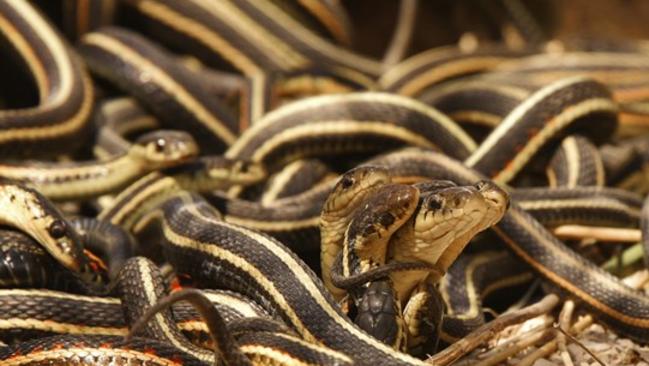Male snakes pay the price for frenzied snake orgies
THE intense and frenzied approach to the mating season is causing male snakes to age faster and die earlier, Sydney researchers say.

THE dating scene can be rough, just ask a male snake.
Due to the intense and frenzied approach to the mating season of snake species and the evolutionary-induced stress of missing out, male snakes are reportedly ageing faster and dying earlier and in worse condition than their female counterparts.
That’s according to scientists led by researchers at the University of Sydney who conducted “snake orgy research” and studied the affects of the high pressure mating rituals of snakes.
They found that compared to female snakes who prioritise body-maintenance over short-term reproductive success, the sexual practices of males is taking a toll on their health and longevity.
Senior author at the University of Sydney Dr Christopher Friesen, explained that the snakes made good use of the relatively short amount of time to procreate, having only four months a year to breed, feed and have babies.
“Although we believe that all females mate every year, they only stay at the den sites (where mating takes place) for a short period of one to three days; much less than males, who remain for at least a week and up to 21 days, which seems to result in males ageing faster and dying earlier than females” he said.
Female snakes reach sexual maturity at three years of age, much later than males who get there at one or two years.
And during that crucial mating period, males don’t eat and must compete with thousands of other males to have success.
Comparatively, females have a much less stressful time and can stay at the orgy site for as little as one day, compared to three weeks for their hopeful suitors.
So in a way, it’s hardly surprising that males are slithering to an earlier grave.
Female snakes also have a very efficient way of capitalising on their time spent in the den, allowing them to fertilise their egg at a time when it is most convenient for them.
“Females reproduce every other year, which depends on their stored fat/energy reserves. Our previous research has shown that females can store sperm for up to 15 months or more before she uses the sperm to fertilise her eggs,” Dr Friesen said.



